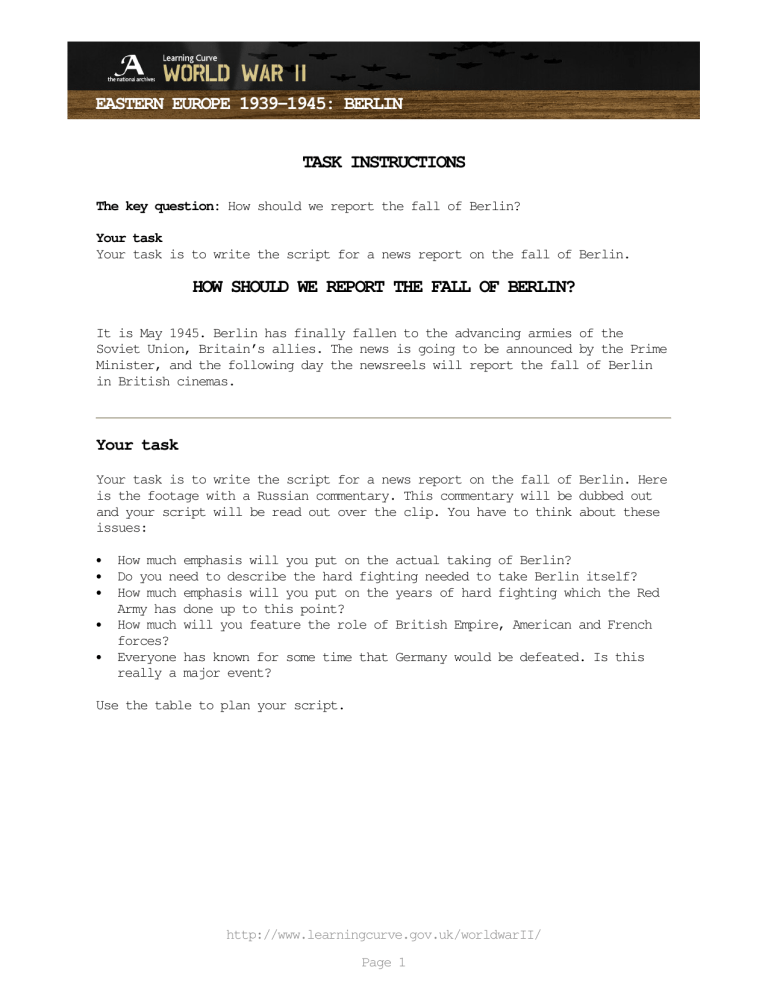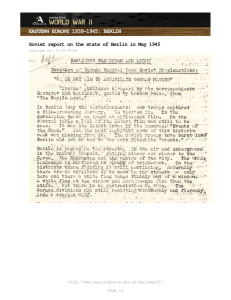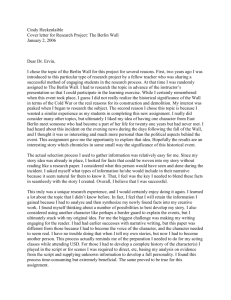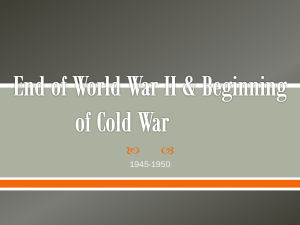EASTERN EUROPE 1939-1945: BERLIN TASK INSTRUCTIONS

EASTERN EUROPE 1939-1945: BERLIN
TASK INSTRUCTIONS
The key question: How should we report the fall of Berlin?
Your task
Your task is to write the script for a news report on the fall of Berlin.
HOW SHOULD WE REPORT THE FALL OF BERLIN?
It is May 1945. Berlin has finally fallen to the advancing armies of the
Soviet Union, Britain’s allies. The news is going to be announced by the Prime
Minister, and the following day the newsreels will report the fall of Berlin in British cinemas.
Your task
Your task is to write the script for a news report on the fall of Berlin. Here is the footage with a Russian commentary. This commentary will be dubbed out and your script will be read out over the clip. You have to think about these issues:
•
How much emphasis will you put on the actual taking of Berlin?
•
Do you need to describe the hard fighting needed to take Berlin itself?
•
How much emphasis will you put on the years of hard fighting which the Red
Army has done up to this point?
•
How much will you feature the role of British Empire, American and French forces?
•
Everyone has known for some time that Germany would be defeated. Is this really a major event?
Use the table to plan your script. http://www.learningcurve.gov.uk/worldwarII/
Page 1
EASTERN EUROPE 1939-1945: BERLIN
A clip from a newsreel called Russians enter Berlin with commentary in Russian, 1945
Catalogue ref: BP010145162919
Courtesy of ITN/Source , London.
What is this source?
This source is an extract from a news film shot in Berlin in 1945. The Red
Army took camera operators on all its campaigns. All sides in WW2 understood the value of film for information and propaganda purposes.
The film was shot as silent film out in the battlefield. Sound would then be added in a studio later. This clip has its Russian soundtrack.
What’s the background to this source?
One of Hitler’s key aims in WW2 was to invade and destroy the Soviet Union and build a German empire in Eastern Europe. He invaded the USSR in June 1941 and at first it looked like he would succeed. However, he was stopped by the
Russian winter in 1941 and then by stubborn Soviet resistance in 1942-3. By the start of 1943 the tide began to turn against the Germans. By 1944 all
German forces were driven out of the USSR. By 1945 the Red Army was moving into Germany and it took Berlin in May 1945.
German propaganda had given the Soviets a terrible reputation in the minds of many Germans. As a result, many German soldiers and civilians fought on against the Red Army in 1945 when many others gave up when facing the British and American forces. Thus, although the war was clearly lost when the Red Army reached Berlin, German forces still followed Hitler’s orders to defend the city. The Red Army attacked the city on April 16th and the fighting lasted until May 2nd. The Soviets suffered well over 300 000 casualties. German losses are estimated to be even higher.
It's worth knowing that…
The scale of the campaign on the Eastern Front was far larger than any other campaign in the war. In 1944 there were five times as many Soviet divisions fighting Germans, as there were British and American. Soviet losses during WW2 were also enormous. The USSR lost over 20 million military and civilian dead. http://www.learningcurve.gov.uk/worldwarII/
Page 2
EASTERN EUROPE 1939-1945: BERLIN
There is still disagreement today over the last days of the war. Some historians have emphasised the looting and raping carried out by Soviet troops on German civilians in 1945. Other historians point out the terrible atrocities committed by the Germans on Soviet territory earlier in the war.
How will you use this source?
1.
What does this clip tell you about the nature of the fighting in Berlin in
1945?
2.
What effect has the fighting had on Berlin?
3.
Do you get the impression this is a genuine battlefield film rather than one that has been staged?
4.
Does any of the footage look as if it has been filmed for a particular purpose?
5.
Which three scenes will feature strongly in your script?
Use the report table to help plan your report. http://www.learningcurve.gov.uk/worldwarII/
Page 3








